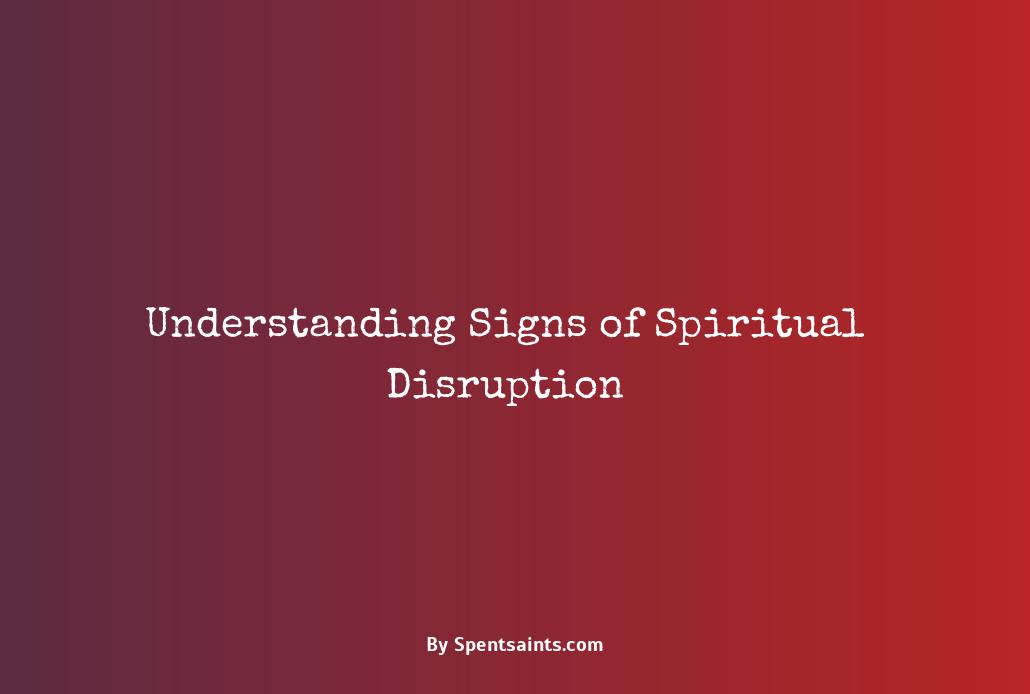Experiencing spiritual disruption can be unsettling. You may feel off-balance, distressed, or disconnected from your purpose. Recognizing the signs of spiritual disturbance empowers you to take steps toward realignment.
It covers potential causes, plus strategies to restore inner peace and equilibrium.
Defining Spiritual Disturbance
Spiritual disruption refers to anything disrupting your sense of inner peace, life purpose, or connection to something greater than yourself. You may feel spiritually out of sorts when your beliefs, values, or worldview feel threatened or lose meaning.
Common signs of spiritual distress include:
- Feeling lost, confused, or lacking direction
- Experiencing anger, grief, emptiness, or despair
- Doubting your beliefs or sense of meaning/purpose
- Withdrawing from spiritual practices or community
- Engaging in unhealthy behaviors as a coping mechanism
You may struggle to pinpoint the cause. Or you might trace your distress to specific life events prompting an existential crisis.
What is an Existential Crisis?
An existential crisis refers to intensely questioning life’s purpose and meaning. It often stems from pivotal life events prompting self-evaluation about deeply-held beliefs and values.
Examples include:
- Loss of a loved one
- Serious illness or brush with mortality
- Career setbacks or retirement
- Questioning long-held assumptions about reality/purpose
An existential crisis can profoundly challenge your worldview, leading to spiritual disruption. The good news? This discomfort suggests room for growth. With self-work, you can emerge with greater wisdom and clarity.
Common Signs of Spiritual Distress
How can you identify spiritual disruption? Tune into both emotional and physical cues signaling inner unrest. Be on the lookout for:
1. Feelings of Emptiness, Despair, or Existential Dread
Do you find yourself preoccupied with thoughts like:
- “What’s the point of existence?”
- “I feel no purpose or meaning in life anymore.”
- “Nothing really matters when we all die anyway.”
A profound sense that life lacks meaning suggests your spirit feels deeply troubled. You may wrestle with nihilism, cynicism, or hopelessness about finding purpose again.
Other telltale feelings include anger, grief, melancholy, hollowness inside, or lack of fulfillment from once-enjoyed activities.
2. Disconnection from Spiritual Practices
Do spiritual rituals like prayer, meditation, or attending services fail to uplift you nowadays? Have you lost interest in these practices altogether?
Your spirit may feel too troubled to focus during meditation. Or hollow rituals may ring empty when core beliefs feel threatened. Withdrawing from previously sustaining practices signals spiritual distress.
3. Compulsive Behaviors as Coping Mechanisms
Unhealthy habits like overeating, excessive drinking, drug use, gambling, or impulsive behaviors sometimes manifest when spirits feel troubled.
You may attempt quick fixes chasing temporary pleasure or distraction from the void within. Or risky behaviors help catalyze intensity and feeling alive. Unfortunately, the relief rarely lasts.
Addictive patterns often worsen spiritual unrest long-term. The key is addressing core issues prompting the spirit’s distress in the first place.
4. Chronic Physical Symptoms
Long-term stress taxes the body, depleting hormones crucial for health. Spiritual distress can manifest physically as:
- Headaches or other unexplained pains
- Exhaustion, trouble sleeping, or restless sleep
- Gut issues like nausea, diarrhea, or loss of appetite
- Weakened immunity making you prone to illnesses
Don’t ignore these subtle cues. Physical symptoms often give clues to overlooked spiritual unrest.
Causes of Spiritual Unrest
Spiritual distress arises for diverse reasons. By reflecting on root causes, you gain wisdom for moving forward.
Common catalysts include:
Grieving Loss
Death of a loved one, ended relationship, job loss, health crisis, natural disaster, retirement, or children leaving home can all spur grief. Even positive transitions like marriage or a new baby prompt change-centered stress.
Grief naturally sparks deep reflection about life’s meaning. Coping with loss often entails periods of spiritual questioning when old assumptions no longer fit.
Worldview Conflicts
Are you wrestling with ideological conflicts? Perhaps current events, science discoveries, or social movements challenge previous beliefs. Or internal changes prompt questioning long-held worldviews.
Moral dilemmas over issues like sexuality, racial justice, gender norms, or role of religion also catalyze spiritual unrest. When life experience diverges from ingrained perspectives, disorientation often follows.
Ego identity Crises
Have you built an identity on titles, possessions, achievements or other externals? Ego-identification with shallow markers inevitably backfires. Setbacks threaten rigid senses of self, sparking spiritual crisis.
The cure? Loosening egoic clinging to welcome fluid growth. Spiritual teachers suggest identifying instead with formless consciousness witnessing experience itself.
Awakenings
For some, spiritual unrest signifies awakening into greater perspective. Questioning assumptions, releasing limiting beliefs, and expanding worldviews all cause growing pains.
Symptoms feel disruptive initially before uplifting clarity dawns. Spiritual disruption sometimes foreshadows deep renewal.
Restoring Spiritual Equilibrium
When your spirit feels troubled, patience and self-care help smooth the transition toward realignment. Consider these strategies for restoring balance:
Release Judgements and Control
Upheaval stems partially from attempting control over uncontrollable change. Practice accepting impermanence in self, others, and life circumstances.
Let go of judging distress as wholly negative. Growth depends on periodically uprooting stable foundations. Spiritual maturation requires dismantling rigid structures so deeper roots may form.
Connect with Supportive Community
Don’t weather spiritual storms alone. Spending time with others who listen, validate, and accept your process supports equilibrium. Share feelings to release bottled up turmoil.
Engage mentors or groups aligned with your values. Community guidance helps anchor inner work.
Commit to Contemplative Practices
Quiet space for reflection allows insight to emerge. Try journaling, nature walks for fresh perspective, or meditative movement like yoga or tai chi to calm racing thoughts.
Consider working with a therapist, coach, or spiritual director. Talking through turmoil promotes understanding. Expert guidance facilitates navigation toward realignment.
Reduce stress through healthy lifestyle choices like nutritious anti-inflammatory foods, regular exercise, loving relationships, adequate sleep and stress relief practices.
When the body feels vibrant, clarity follows more easily. Invest in self-care fundamentals so deeper spiritual work can unfold.

Dreams, spirit, growth – I explore them all. Laugh, learn, grow with me. Unlock your inner guru.
